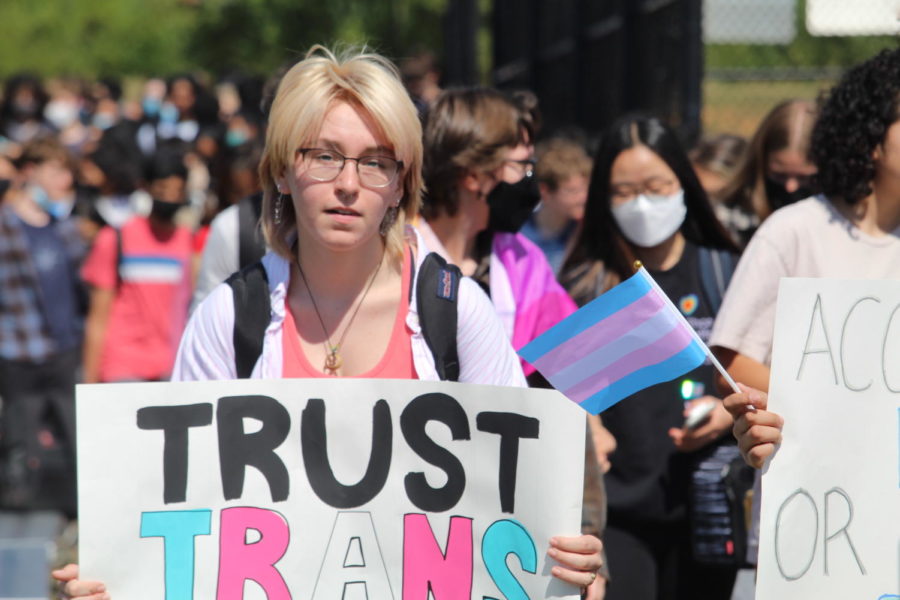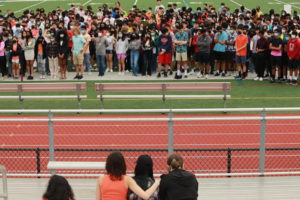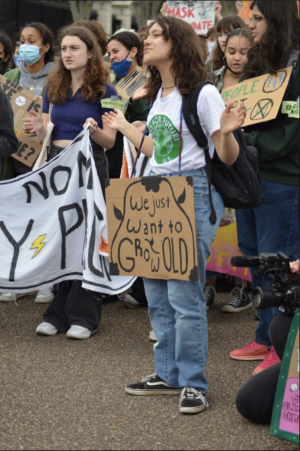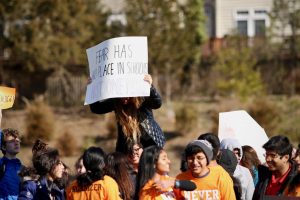Students across Virginia protest transgender model policies
Thousands of students across Virginia protested the VDOE’s new model policies regarding transgender and LGBTQIA+ students on Sept. 27. Jefferson students are seen walking as they chant phrases like “accept we exist or we will resist” and prepare to listen to speeches by transgender and LGBTQ+ students during lunch. “This walkout was a show of solidarity amongst students in the state,” junior Sri Vellakkat said. “It was an effort to protest the DOE’s measures. It was an effort to ensure the DOE knows how we, as students, feel.”
September 28, 2022
High school students across Virginia held walkouts on Sept. 27 protesting the Virginia Department of Education’s (VDOE) newly proposed model policies regarding transgender and LGBTQIA+ students. The Pride Liberation Project, run solely by students in Virginia, organized walkouts at approximately 100 high schools across the state. Jefferson’s walkout took place from 11:45 a.m. to 12:00 p.m.
The policy changes will grant parents the power to decide what name and pronouns their child is acknowledged by in school (II.A.2), and require teachers to refer to students by those names, regardless of the student’s wishes (III.D.3). Students will be required to use restrooms, locker rooms (III.G.3), and participate in sports (III.H.1) based on their biological sex, not their preferred gender. Further, the model policies will require teachers to out transgender students to their parents (II.A.3).
“[The walkout] is about raising awareness,” junior Ash Kelley said. “Given where [Jefferson] typically falls on the political spectrum, I would be fairly surprised if the policies are put into effect through teaching. It really is about raising awareness for what could happen across Virginia.”
In 2020, the Virginia General Assembly required the VDOE to develop model transgender policies providing information and procedures on “common concerns” regarding transgender students (bills SB 161 and HB 145). On Sept. 16, 2022, the VDOE proposed newly revised model policies regarding transgender and LGBTQIA+ students in Virginia meant to replace the 2021 model policies.
Further, the Pride Liberation Project provided this document summarizing the model policies and explaining how they would be implemented.
“For individuals, it is a really, really big deal to have that place where you can be yourself. It broadens the impact. It gives a new perspective,” Kelley said. “The students are the ones that are directly impacted. This takes away from the right that students have to have a safe and protected environment in exchange for granting parents [the] means of controlling how those students express themselves.”
With the policies providing parents with the power to determine how their children are acknowledged in school and requiring teachers to out students to their parents, Kelley encourages people to recognize that not everyone feels safe being out to their parents.
“It makes being yourself and being out a lot harder [with] the potential for a negative experience,” Kelley said. “So much of your life is centered around your home at this age. You can’t go elsewhere. I can’t just walk up and leave. I don’t have a stable income; I can’t provide myself. And because of that, you can’t always be yourself.”
A 30-day public comment period on the new model policies began on Sept. 26.
“We urge everyone who can to show up at school board rallies [and] protest against this,” junior Sri Vellakkat said. “Let people know that they are supported. That no matter what happens, their names, their pronouns, their identities are who they are, not what society forces them to be.”









